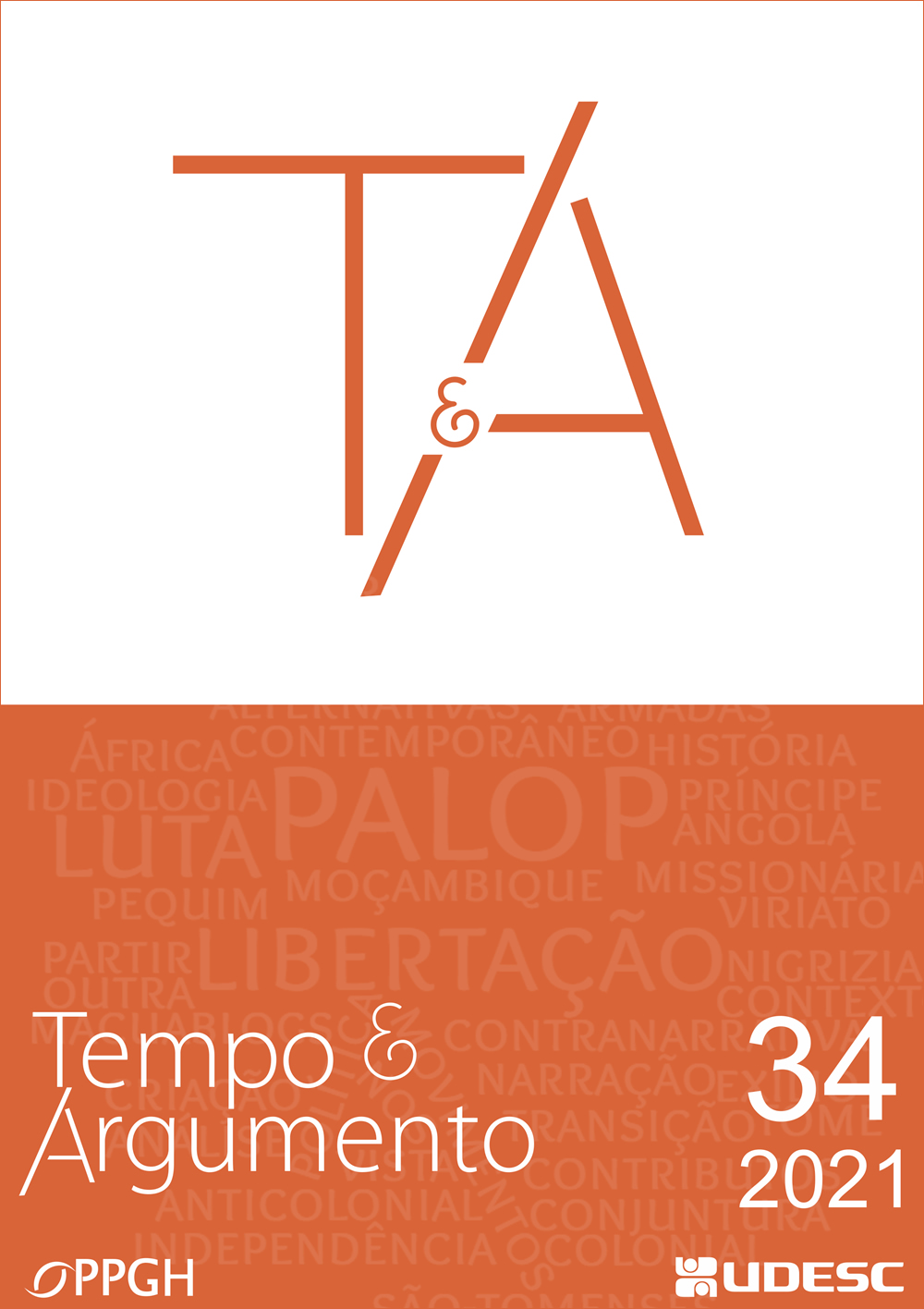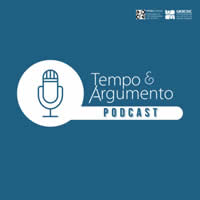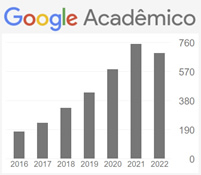Por uma história digital: o ofício de historiador na era da internet
DOI:
https://doi.org/10.5965/2175180313342021e0201Resumen
Este artigo tem como objetivo discutir os impactos da era da internet no ofício do historiador, com ênfase na pesquisa histórica e nas formas de mediação e divulgação do conhecimento histórico na esfera pública das mídias digitais. A partir de uma análise de fontes bibliográficas, problematiza os desafios epistemológicos e metodológicos que a chamada revolução digital impôs aos profissionais da área de História. Defende a importância da história digital para a compreensão das experiências humanas na contemporaneidade e apresenta uma proposta de definição desse campo historiográfico com base no caráter digital de seus objetos de estudo. Aponta ainda a necessidade de readequações no método da crítica histórica, argumentando que novos diálogos interdisciplinares são fundamentais para a diversificação do repertório metodológico das pesquisas históricas frente aos desafios decorrentes da análise das fontes digitais. Em seguida, aborda as transformações provocadas pela cultura digital em relação às formas de mediação e de divulgação do conhecimento histórico para um público amplo, demonstrando que os atuais recursos da web trouxeram novas possibilidades e desafios aos praticantes de uma história pública digital. Finalmente, discute a função social do historiador em uma época marcada pelos complexos fenômenos das fake news e da pós-verdade, destacando a importância da atuação dos historiadores na esfera pública das mídias digitais para combater as tentativas de falseamento da realidade e o negacionismo histórico.
Palavras-chave: história digital; história pública digital; internet; fake news; pós-verdade.
Descargas
Citas
ALMEIDA, Juniele Rabêlo de; ROVAI, Marta Gouveia de Oliveira. Apresentação. In: ALMEIDA, Juniele Rabêlo de; ROVAI, Marta Gouveia de Oliveira (Org.). Introdução à história pública. São Paulo: Letra e Voz, 2011, p. 7-15.
ARENDT, Hannah. Verdade e política. In: Entre o passado e o futuro. 8. ed. São Paulo: Perspectiva, 2016, p. 167-191.
BLOCH, Marc. Apologia da história ou o ofício de historiador. Rio de Janeiro: Jorge Zahar, 2001.
BLOCH, Marc. Reflexões de um historiador sobre as falsas notícias da guerra. In: História e historiadores. Lisboa, Teorema, 1998, p. 177-198.
CARDOSO, Ciro Flamarion. Uma introdução à História. 5. ed. São Paulo: Brasiliense, 1981.
CARVALHO, Bruno Leal Pastor de. Faça aqui o seu login: os historiadores, os computadores e as redes sociais online. Revista História Hoje, v. 3, n. 5, p. 165-188, 2014.
CARVALHO, Bruno Leal Pastor de. História Pública e redes sociais na internet: elementos iniciais para um debate contemporâneo. Revista Transversos. Rio de Janeiro, v. 7, n. 7, p. 35-53, set. 2016. Disponível em: <https://doi.org/10.12957/transversos.2016.25602>. Acesso em: 23 maio 2021.
CASTELLS, Manuel. Redes de indignação e esperança: movimentos sociais na era da internet. 2. ed. Rio de Janeiro: Zahar, 2017.
CERUZZI, Paul E. A history of modern computing. 2. ed. Cambridge: Mass. & London, The MIT Press, 2003.
CHRISTOFOLETTI, Rogério; TRICHES, Guilherme L. Interesse público no jornalismo: uma justificativa moral codificada. Revista Famecos: mídia, cultura e tecnologia, Porto Alegre, v. 21, n. 2, p. 484-503, maio/ago. 2014. Disponível em: <http://revistaseletronicas.pucrs.br/ojs/index.php/revistafamecos/article/view/17588>. Acesso em: 14 jun. 2021.
COHEN, Daniel J.; ROSENZWEIG, Roy. Digital history: a guide to gathering, preserving and presenting the past in the Web. Philadelphia: University of Pennsylvania Press, 2005.
DAHLGREN, Peter. The internet, public spheres and political communication: dispersion and deliberation. Political Communication, n. 22, p. 147-162, 2005.
DUMOULIN, Olivier. O papel social do historiador: da cátedra ao tribunal. Belo Horizonte: Autêntica, 2017.
EIROA, Matilde. El pasado en el presente: el conocimiento historiográfico en las fuentes digitales. Ayer: Revista de Historia Contemporánea, n. 110, p. 83-109, jul./dic. 2018.
FICKERS, Andreas. Towards a new digital historicism? Doing History in the age of abundance. Journal of European Television History and Culture, vol. 1, n. 1, p. 19-26, 2012. Disponível em: <https://www.viewjournal.eu/articles/abstract/10.18146/2213-0969.2012.jethc004/>. Acesso em: 30 abr. 2021.
FLÓREZ, Jairo Antonio Melo. Historia digital: la memoria en el archivo infinito. Historia Critica, Bogotá, n. 43, p. 82-103, ene./abr. 2011.
GALLINI, Stefania; NOIRET, Serge. La historia digital en la era del Web 2.0: introducción al dossier Historia digital. Historia Critica, Bogotá, n. 43, p. 16-37, ene./abr. 2011.
GRUZINSKI, Serge. ¿Para qué sirve la historia? Madrid: Alianza Editorial, 2018.
HEIMBURGUER, Franziska; RUIZ, Émilien. Faire de l’histoire à l’ère numérique: retour d’expériences. Revue de l’Histoire Moderne et Contemporaine, n. 58-4, p. 70-89, 2015.
HOBSBAWM, Eric J. A era das revoluções: Europa, 1789-1848. 22. ed. São Paulo: Paz e Terra, 2007.
HOBSBAWM, Eric J. A era dos impérios: 1875-1914. 13. ed. São Paulo: Paz e Terra, 2009.
KAKUTANI, Michiko. A morte da verdade: notas sobre a mentira na era Trump. Rio de Janeiro: Intrínseca, 2018.
LACAVA, Juan Andrés Bresciano. La heurística digital y el estudio histórico de los procesos de globalización. Historia Critica, Bogotá, n. 43, p. 104-127, ene./abr. 2011.
LE GOFF, Jacques. História e memória. 5. ed. Campinas-SP: UNICAMP, 2003.
LUCCHESI, Anita. Histórias no ciberespaço: viagens sem mapas, sem referências e sem paradeiros no território incógnito da web. Cadernos do Tempo Presente, São Cristóvão, n. 6, 2012. Disponível em: <https://seer.ufs.br/index.php/tempo/article/view/2624/2256>. Acesso em: 08 out. 2019.
MOROZOV, Evgeny. Big Tech: a ascensão dos dados e a morte da política. São Paulo: Ubu Editora, 2018.
NOIRET, Serge. História pública digital. Liinc em Revista, Rio de Janeiro, v. 11, n. 1, p. 28-51, maio 2015. Disponível em: <http://revista.ibict.br/liinc/article/view/3634>. Acesso em: 29 mar. 2019.
NORA, Pierre. L’ère de la commémoration. In: NORA, Pierre. (dir.). Les lieux de mémoire (Les France). V. 3. Paris: Gallimard, 1997, p. 4687-4719.
O’REILLY, Tim. What is Web 2.0? Design patterns and business models for the next generation of software. Communications & Strategies, n. 65, 2007, p. 17-37. Disponível em: <https://mpra.ub.uni-muenchen.de/4578/1/MPRA_paper_4578.pdf>. Acesso em: 22 out. 2019.
OXFORD Languages. Word of the Year 2016. Oxford: Oxford University Press. Disponível em: <https://languages.oup.com/word-of-the-year/2016/>. Acesso em: 08 jun. 2021.
PARISER, Eli. O filtro invisível: o que a internet está escondendo de você. Rio de Janeiro: Zahar, 2012.
PONS, Anaclet. Archivos y documentos en la era digital. Historia y Comunicación Social, Madrid, v. 22, n. 2, p. 283-296, 2017.
PROST, Antoine. Doze lições sobre a História. 2. ed. Belo Horizonte: Autêntica, 2015.
RODRIGUES, Icles. História no YouTube: relato de experiência e possibilidades para o futuro. In: CARVALHO, Bruno Leal Pastor de; TEIXEIRA, Ana Paula Tavares (Org.). História pública e divulgação de história. São Paulo: Letra e Voz, 2019, p. 73-92.
ROSENZWEIG, Roy. Clio wired: the future of the past in the digital age. Columbia University Press, 2011.
SANTHIAGO, Ricardo. História pública e autorreflexividade: da prescrição ao processo. Tempo e Argumento, Florianópolis, v. 10, n. 23, p. 286‐309, jan./mar. 2018. Disponível em: <http://dx.doi.org/10.5965/2175180310232018286>. Acesso em: 23 maio 2021.
SCHAFER, Valérie; THIERRY, Benjamin. L’ogre et la toile. Le rendez-vous de l’histoire et des archives du web. Socio, n. 4, p. 75-95, 2015. Disponível em: <http://journals.openedition.org/socio/1337>. Acesso em: 09 abr. 2019.
Descargas
Publicado
Cómo citar
Número
Sección
Licencia
Derechos de autor 2021 Revista Tempo e Argumento

Esta obra está bajo una licencia internacional Creative Commons Atribución-NoComercial 4.0.
Os artigos cujos autores são identificados representam a expressão do ponto de vista de seus autores e não a posição oficial da Tempo e Argumento.





